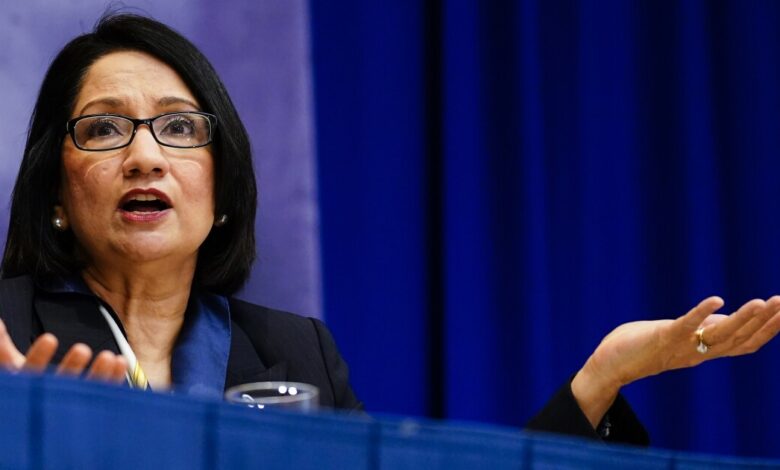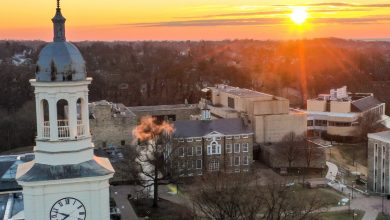How the Fate of a “Racial-Justice Center” Ensnarled Penn State’s New President in Controversy

How Bendapudi arrived at and conveyed her decision to scrap the center, through a series of ill-timed, tense, in-person and virtual meetings with a rolling cast of administrators, faculty, and students, has resulted in widespread confusion, roiling protests, and a ubiquitous belief among faculty and students that she is not earnestly committed to racial justice. Her decision, faculty members said in a petition now signed by 400 people, adds to a “long list of broken promises on issues of racial justice by Penn State.”
“This center represented a very important symbol, and she took that away from us,” said Gary King, a Penn State professor of biobehavioral health and African American studies. “The very name itself stated something that Penn State had never done.”
The Chronicle spent several days at University Park, Penn State’s largest campus, speaking to administrators, faculty, and students, and pouring through emails, campus announcements, and videos of press conferences and town halls to piece together the series of events that’s left this sprawling system sharply divided over how to fight racism and has placed its new president on the defense.
“I messed up on the communication,” Bendapudi said during an interview with The Chronicle last month. “I have been an unapologetic, staunch advocate for diversity and equity for a long time. That’s not new, and that’s not going to change. I 100-percent stand behind my decision as my best judgment of what is right for this institution.”
The falling out illustrates the sort of landmines university leaders have faced in recent years when trying to communicate and build support for racial-justice efforts.
At Penn State, there’s widespread agreement that the university, for a variety of reasons, has struggled to recruit and retain students of color, despite Black and Latino students making up a growing portion of Pennsylvania’s high-school graduates. The university, which is rapidly losing enrollment, now faces a budget deficit of more than $191 million.
Critics of Bendapudi say that the Center for Racial Justice would compile racial-disparity data from across the 24-campus system, employ scholars to evaluate that data, and craft universitywide approaches to close those disparities. “One of the hopes was that the center could … compel the university to be very self-reflective and self-critical in acknowledging the ways that it has contributed to and maintained racism,” said Ashley Patterson, a professor in the College of Education.
The decision not to fund the Center for Racial Justice adds to a “long list of broken promises on issues of racial justice by Penn State.”
Other universities — including William & Mary college and Dillard University, a private, historically Black university in Louisiana — have established similar racial-justice centers in recent years. In January, the state of Pennsylvania awarded Temple University a $1.3-million grant to build the Center for Anti-Racism.
But Bendapudi, along with several other Penn State administrators The Chronicle spoke to, insisted that the university needs to focus on measurable goals, such as closing graduation gaps between students of color and white students, growing and diversifying the faculty, promoting staff of color, and improving the sense of belonging among faculty and students on campus. Bendapudi says institutions of higher education have historically not prioritized these issues.
“My concern is that, frankly, every single university is establishing these centers, and I think that’s a great idea,” Bendapudi said during a town hall in November. “But I also worry that is not necessarily what will move the needle for us.”
In the summer of 2020 Bendapudi coined Louisville’s “Cardinal Anti-Racism Agenda,” a list of recommendations that were slated to be finished by September 2020. She said she wanted to make Louisville a “premiere antiracist metropolitan university.” Breonna Taylor, who had been shot and killed by police in the same city, was an emergency-room technician at the university’s medical center.
As part of the new agenda, administrators would dedicate resources toward improving the retention and graduation rates of Black male students, encourage social-justice-related research, and revamp the Bias Incident Response Team, among other things. But student activists said that Louisville’s failure to cut ties with the local police department rendered its other commitments “performative.”
When Bendapudi arrived at Penn State, administrators and faculty were in the throes of attempting to devise a new strategy for addressing racial disparities on campus. Black students make up just 5 percent of the university’s overall enrollment, and Latino students make up about 7 percent. The university’s faculty is 3 percent Black. In a recent study, eight out of 10 Black professors said they experienced racism at the university. At least 70 percent said they didn’t believe that the academic culture at Penn State is one that encourages the pursuit of learning, teaching, and scholarship for Black Americans.
In the summer of 2020, amid nationwide protests after the killing of George Floyd, Penn State’s then-President Eric J. Barron promised to commit to changing the university’s diversity and inclusivity efforts. He convened a task force to review the Student Code of Conduct, initiated mandatory bias training for all employees and students, and worked with the faculty senate to find ways to increase the hiring and retention of diverse faculty members, among other things, according to a university press release. He assigned a separate commission the task of creating a list of recommendations for how the university should tackle bias and racism.
That fall, the commission released a list of four recommendations. They wanted the university to establish a Truth and Reconciliation Process to address its past and present policies that excluded faculty and students of color, fund antiracist research, create a fellowship dedicated to antiracist work, and establish a new antiracist scholarly center or consortium, which was later referred to as the Center for Racial Justice.
This center represented a very important symbol, and she took that away from us.
“The university’s current approaches to DEI do not engage fully or honestly with the aspirations and commitments expressed in [the university’s strategic plan] … and [they] further enable the racism and bias that disproportionately impact the most vulnerable among us,” the proposal said.
Barron saw hope with the fourth proposal to build the Center for Racial Justice. In March, he set aside $3.5 million and created a search committee to find the center’s director.
Campus leaders were most concerned about the support and retention of students of color, she said. They didn’t talk explicitly about the Center for Racial Justice, so she came to the conclusion that a new center may not be the most economical or effective approach.
Around the same time, Bendapudi told the campus that administrators would have to institute a hiring freeze, effective August 1, due to stagnant state funding and enrollment losses coming out of the pandemic.
On September 7, Bendapudi met with the committee searching for a director of the center and told them that the university was having a budget crisis and had not yet set aside $3.5 million for the center.
A week later, King wrote a letter to the editor in The Daily Collegian quoting Langston Hughes’ poem, “A Dream Deferred,” citing a long list of disparities between Black and white faculty members and referencing a “rumor” that the center may not be created.
“I suspect that Penn State President Neeli Bendapudi has had less time to enjoy a ‘summer honeymoon’ as the incoming president of our great university,” he wrote. “Perhaps some of us were under the illusion that having a person of color as the head of the university and a Black chief of staff would automatically ‘fix the problem …’ We cannot and should not simply trust the administration or the Board of Trustees to do the right thing. I truly hope it is not the case that they have run out of will, rather than having run out of money. Because where there is a will, there is surely a way.”
On October 6, the search committee sent Bendapudi an email urging her to be transparent with the university about the “setback” and suggesting that establishing a new timeline for the center or an alternative plan would be better actions to take.
“Penn State does not have a solid reputation for adequately addressing social injustices, inclusion, and racism,” they said. “Without such a reputation, this cancellation is likely to affect the ability of the university to recruit and retain top faculty, who may strengthen existing or create new revenue streams, lead by example in this space, and produce critical new scholarship and public activity around race and the study of it.”

Lea Millis, Reuters via Redux
But on October 24, hundreds of students, faculty, and alumni gathered to protest. One held up a sign that read “racists off our campus.” The protest grew violent, and state troopers rode in on horseback. At least one physical altercation started, and both police and protesters unleashed chemical spray. In response to the “escalating violence,” administrators abruptly canceled the Proud Boys event, chiding protesters in the process.
“We have encouraged peaceful protest, and, while protest is an acceptable means of expression, it becomes unacceptable when it obstructs the basic exchange of ideas,” the university’s administrators said in a statement. “Such obstruction is a form of censorship, no matter who initiates it or for what reasons. The University expects that people engaging in expressive activity will demonstrate civility, concern for the safety of persons and property, respect for University activities and for those who may disagree with their message, and will comply with University rules.”
On October 26, Penn State issued a universitywide statement that it would not fund the Center for Racial Justice.
“I have determined that enhancing support for current efforts by people who know Penn State best will be more impactful than investing in a new venture, and so we will not pursue efforts to launch a Center for Racial Justice,” Bendapudi said in the statement.

Lea Millis, Reuters via Redux
In a November email to administrators, “concerned faculty” from the department of curriculum and instruction at Penn State’s College of Education said the announcement to defund the Center for Racial Justice had been done insensitively and was poorly timed. “We are troubled to see that recent statements and actions of the University at large are complacent at best, perpetuating practices that are long overdue for renewal,” the email said. “Our interpretation of the goals recently announced to the Board are a regression from bold, antiracist commitments to infusing equity at all levels of University operations toward the type of outdated, uninspired undertaking of diversity and multiculturalism goals akin to those touted in the 1990s — both in spirit and in rhetoric.”
Rumor and speculation began to fly. The shuttering of the center was seen by some as retaliation for the counterprotest of the Proud Boys event. Others pointed a finger at the Board of Trustees, claiming that its members forced Bendapudi to get rid of the center. The board denied those claims.
“Dr. Bendapudi impressed the Board of Trustees and the Presidential Recruitment and Selection Committee with her considerable experience, effective outcomes, and her career-long history of antiracism work,” Penn State’s board said in an email to The Chronicle. “As indicated previously, the Board supports the work and actions President Bendapudi is taking to update our University operations and align our efforts with our key strategic priorities — one of which is ensuring DEIB throughout our entire University ecosystem.”
The week before Thanksgiving break, Bendapudi appointed Jennifer Hamer, a professor of African American studies and women’s, gender, and sexuality studies, to lead a universitywide effort to evaluate the diversity, equity, inclusion, and belonging recommendations, programs, and research across the university’s 24 campuses.
During a recent virtual town hall, Bendapudi stressed the importance of supporting employees who were already doing equity-related work. She answered questions fielded by two faculty members.
“How would the university attract students of color now that the center has been canceled?” “How does the administration plan to establish shared governance and include faculty in its decision making?” “What do you tell faculty and staff who put scholarly research into a recommendation for a center for racial justice?”
Faculty members felt that the format of the town hall, which did not allow them to directly question Bendapudi, left them with little trust in the administration.
“The town hall with a highly mediated question-submission process is an underwhelming approach to building trust,” faculty members from the department of curriculum and instruction wrote in their November letter to Bendapudi. “While we believe communication is key and appreciate University leadership’s stated commitments to building trust, we see the town hall in its current format as giving the impression that only those questions that University administration wants to answer will be considered and addressed.”
When asked during the town hall what she wanted to say to faculty members who are disappointed in her decision to not follow through with the center, Bendapudi asked for patience.
“The timing of the whole thing was terrible, and I know how much pain it caused,” she said. “But my heart is in this work. My commitment is in this work.”
Throughout the town hall, Bendapudi stressed the importance of working together to meet the newly established goals of the administration.
“I ask for a little time and a little grace.”
Source link






